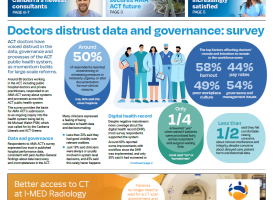AMA calls for action on women's health on World Menopause Day
To mark World Menopause Day, The Australian Medical Association is calling for urgent action to address wide-ranging disparities affecting women's health.

The AMA has released its position statement on women’s health which highlights the unique health challenges women in Australia face — from barriers to accessing sexual and reproductive healthcare to a historic lack of female representation in medical research.
The statement introduces new sections on perimenopause and menopause, advocating for a national framework to establish goals and timelines for changes to treatment in Australia; and has been updated to cover issues including sexual and reproductive health and gendered violence.
AMA President Dr Danielle McMullen said around one in three women experience menopause symptoms severe enough to disrupt daily activities, yet we lack a national framework for care.
"Perimenopause and menopause are also times to identify women at greatest risk of diabetes, heart disease, osteoporosis, and some cancers — conditions that can be prevented with the right support," Dr McMullen said.
Dr McMullen said the statement addresses critical gaps in women's healthcare and calls for immediate action.
"Women carry a disproportionate burden of chronic disease throughout their lives yet face systemic barriers in accessing appropriate care and treatment," Dr McMullen said.
"We need properly funded services, evidence-based care, and a health system that recognises women's specific and individual healthcare needs."
The statement highlights the ongoing lack of gender-specific research and advocates for improved data collection, analysis and evaluation to inform better policy and service delivery for women.
"For too long, medical research has excluded women or failed to analyse data by sex and gender. This knowledge gap has real consequences — treatments that may benefit women could be unavailable, while others may prove suboptimal," Dr McMullen said.
The position statement also address critical gaps in sexual and reproductive health, expands on the definition of gendered violence, and calls on governments to provide continuous and adequate funding for women’s healthcare.
“Improving women’s health requires a whole-of-system approach that embeds equity into policy, research, service design, and delivery,” Dr McMullen said.
"All women in Australia deserve access to affordable, timely, quality healthcare that recognises their unique needs. Governments must provide adequate funding and fully implement existing strategies to deliver real change."



